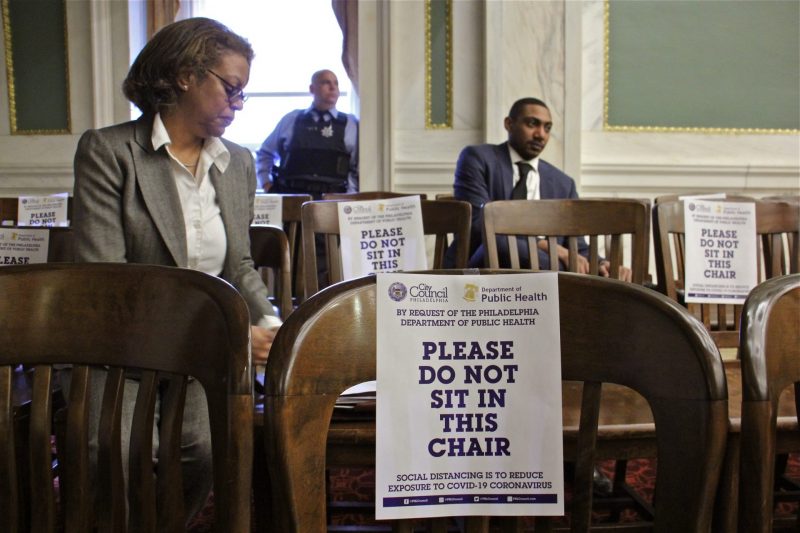
Emma Lee / WHYY
Local governments across the state urged steps to clarify rules during emergency situations like the coronavirus outbreak
Benjamin Pontz
The Pennsylvania Senate passed a bill Tuesday that would allow local government agencies to hold meetings remotely for the duration of the COVID-19 emergency.
The legislation, which has similar provisions on public meetings to a bill that passed the House unanimously in late March, would allow local governments to use video conferencing software, conference calls, or any other method of remote meeting that allows for audio communication between individuals and would expressly waive requirements in the codes for boroughs and third-class cities that require an in-person quorum to conduct official business.
The Senate did not take up that House bill, choosing instead to work with the Pennsylvania District Attorneys Association to disseminate guidance on complying with the state’s Sunshine Law. But municipal leaders continued to express a desire for more clarity, particularly as to whether boroughs and third-class cities could conduct business via remote meetings.
This legislation provides that desired clarity.
“It gives our folks certainty moving forward,” said Rick Schuettler, executive director of the Pennsylvania Municipal League.
Sen. Scott Martin (R-Lancaster), who chairs the Senate Local Government Committee, had previously prioritized providing guidance over passing legislation, but he said after passage Tuesday that he was happy to respond to municipal leaders’ concerns and “give them that clarity [so] that they feel comforted.”
“Obviously, it was very evident that there was a disparity in solicitor opinions in how municipalities have been reacting to it,” he said. “Some have already been doing remote meetings, but others were really panicking because their solicitor said they had to be physically present. We don’t want people to panic.”
He added that had the Senate taken up the House bill, it would have required going through the whole committee process, possibly delaying final action by weeks. Instead, the Senate attached the language about meetings to an existing bill amending the Pennsylvania Code that had already passed the House and Senate once and now requires only a concurrence vote in the House to head to the governor’s desk.
Specifically, the bill would allow municipalities to hold remote meetings for the duration of the emergency and do so without a quorum that is physically present. It adds the following requirements:
- Advance notice — including details about how the public can participate — must be provided via an agency’s website, a newspaper, or both, to the extent practicable
- Draft minutes of any meeting conducted without advance notice to address issues related to the governor’s emergency declaration must be posted within 20 days of the meeting or before the organization’s next meeting, whichever comes first
- No plans or submissions unrelated to COVID-19 can be considered unless they have been provided to the public five days prior to the meeting
- Public comment must be permitted either during the meeting through the telecommunication device or to be submitted in advance via email or mail, to the extent practicable
The bill also pauses statutory timelines that require municipalities to hold hearings on building permit applications, zoning variances, and other petitions within 30 days. It would, however, allow petitioners to agree to hold hearings on those issues remotely if the municipalities are able under the framework of the act.
These modifications apply only to the COVID-19 emergency, but an amendment to Title 35 of the Pennsylvania Code, which governs emergencies in general, would make a permanent allowance for remote meetings under the borough and third-class city codes during declared emergencies.
Both Schuettler and Erik Arneson, executive director of the Pennsylvania Office of Open Records, signaled a desire to have a discussion after this crisis about additional legislative changes.
“The current pandemic has shown that we should take a thoughtful, comprehensive look at how the Sunshine Act and the Right-to-Know Law apply in any similar future emergency,” Arneson said. “Overall, I think the laws are working well in the current pandemic. But there have been a lot of questions, and clarity is important. And by eliminating as many questions as possible, we can increase transparency during future emergencies, which is critical. Transparency tends to be most important when it’s least convenient.”
PA Post is an independent, nonpartisan newsroom covering politics and policy in Pennsylvania. For more, go to PaPost.org.